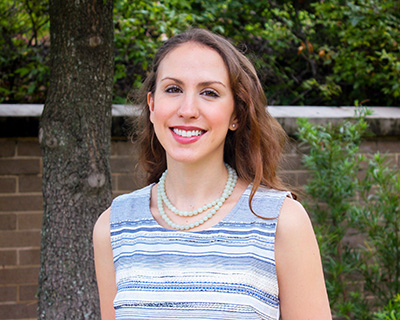COMD doctoral candidate plans a career in research and clinical education
September 1, 2015

Alex Basilakos
Even though she loves to travel abroad, Norman J. Arnold Doctoral Fellow Alexandra (Alex) Basilakos (Department of Communication Sciences and Disorders (COMD) in the Arnold School of Public Health) has kept her undergraduate and graduate studies firmly planted in the South. Born and raised in Greenville, S.C., Basilakos first attended the University of South Carolina in 2005 to earn a Bachelor of Arts degree in experimental psychology and a minor in Spanish. During this program, she had her first experience with research when she won a Magellan Fellowship to investigate a potential pharmacotherapy for methamphetamine addiction.
She also became aware of the growing field of COMD. “I first learned of aphasia during a cognitive neuroscience course,” says Basilakos. “I remember watching videos of patients with aphasia and becoming fascinated with how the brain adapts following damage—so I became interested in a career in the communication sciences, particularly studying neurologic communication disorders.”
After graduation, Basilakos headed over to the University of Georgia to complete a Master’s in COMD. She logged numerous hours in the program’s Aphasia and Neurogenics lab, researching attention and working memory in post-stroke individuals. Basilakos also gained clinical experience at the Atlanta-based Shepherd Center, one of U.S. News and World Report’s 10 Best Hospitals for Rehabilitation, working with adolescents and adults with spinal cord and brain injuries. Upon graduation, Basilakos helped Cobb County, Ga. high school students with learning disorders, autism spectrum disorders and traumatic brain injury as a speech-language pathologist. Through this position, she obtained her Certificate of Clinical Competence from the American Speech-Language-Hearing Association.
When Basilakos decided to return to school to earn a doctoral degree, she believed the Arnold School’s COMD department offered the right program for her. “As an undergraduate, I experienced first-hand that USC has excellent resources for student research and a strong research initiative as an institution overall,” she says. “Additionally, as a master’s student at UGA, I had read many of Julius Fridriksson’s research studies and found his work innovative and fascinating.”
With only a year left before she graduates with a PhD in COMD, Basilakos knows her instincts were right. Fridriksson now serves as her dissertation chair. She has also found mentors in COMD’s Roozbeh Behroozmand and Dirk den Ouden as well as Chris Rorden in the Department of Psychology.
“They have pushed me to think about theories, logic and argumentation in my writing and that of others, scientific approaches, and methodology,” Basilakos says. “I’ve also grown as a clinician—observing their interactions with patients has taught me the importance of clinician-patient interactions, and I’ve seen first-hand how their work has had a positive impact on patients and their families.”
The Presidential Fellow has also developed her own unique perspective. Basilakos’ research interests include the study of post-stroke aphasia as well as motor speech disorders that can occur following stroke, brain damage or neurodegenerative processes. “I am interested in using structural and functional neuroimaging techniques to understand neuroanatomical networks during normal and disordered speech and language production,” she says. “I hope to use these techniques to improve understanding of post-stroke neural plasticity and to improve treatments for post-stroke communication disorders.”
Basilakos has authored two papers in Stroke and Frontiers in Neuroscience and co-authored several others that have either been published or are currently in progress. On the clinical side, she works part-time as a speech-language pathologist at Palmetto Health Baptist. Fittingly, she plans to combine these two components of her field when it comes to her career plans.
“Following graduation, I will continue to research as a postdoctoral scholar,” she says. “I ultimately hope to work in academics, focusing on a career in research and clinical education of future speech-language pathologists.” Basilakos recommends integrating research and clinical exposure to future students as well.
For those who have not yet found their way, she encourages them to shadow professionals in their area of interest and obtain research experience. “Especially students interested in clinical work, research involvement is an excellent way to learn about the latest developments in the field, in turn, helping students in their clinical endeavors,” Basilakos says.



_01.jpg)
_02.jpg)